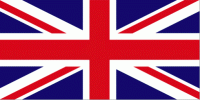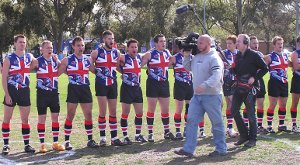Welcome to World Footy News Friday, February 13 2026 @ 01:41 am ACDT
 | Great Britain |  |
This page is a quick snapshot of the status of Australian Football in Great Britain. For further information, browse our news items or use the search facility. If you wish to contact football officials from the country, please search our site for links to their leagues or clubs, including in our Atlas. If unsuccessful, we can normally assist with putting people in touch.
Approx population (2009): 62 million
National side: Great Britain Bulldogs
Governing body: AFL Britain
Primary contact / link: AFL Britain
WFN Census (2004): 21 senior teams, 462 senior players, 0 juniors
WFN World Ranking (2008): Equal 9th
History: Britain is of course the modern home of most forms of football leading up to the modern branches such as Australian football, Rugby and soccer. It has been reported that Australian rules football was played by a British representative rugby team which toured Australia in 1888, and over the next 100 years there have been numerous examples of expat-Aussies playing in London and elsewhere, including regular Oxford versus Cambridge University matches and a local league in the 1960s supported by celebrities such as Rolf Harris.
VFL/AFL exhibition matches were played in London regularly from the 1970s at The Oval, but have been in hiatus since the mid-2000s due to lack of interest from AFL clubs most likely due to difficulty with the short off-season and the requirement to find sufficient sponsorship.
What could be described as the modern era began with the British Australian Rules Football League (BARFL) in 1989, which quickly established clubs in London including multiple divisions, some focussed on catering for Aussies and others mixtures, with regional clubs following in the late 1990s and early 2000s. The most powerful club has been West London, winning a large percentage of all London premierships and regularly fielding three senior sides and has an affiliated women's netball side. During the 2000s various Scottish clubs came and went but since around 2003 there has been a small but reasonably steady league. A league based in Wales began in 2007 and in 2008 the current Welsh Australian Rules Football League was established.
Players from England, Scotland and Wales are all eligible to play for the Great Britain Bulldogs, which has competed at all Australian Football International Cups thus far, and regularly stages Test matches against the best European nations. Players from Northern Ireland have been eligible for the Ireland Warriors but some Irishmen living in England have played for Great Britain.
In 2005 Aussie Rules UK was formed and began a junior program with support from Sport England, and then created regional 9-a-side leagues in part overlapping the existing BARFL structure. For the most part the BARFL's regional clubs at this point either joined the ARUK competitions (in the case of Middlesboro, Thanet, Swindon and Sussex) or joined the BARFL's London social league (Manchester, Nottingham and Bristol), in what could be described as a bitter turf war. The next few years saw many clubs established to compete in ARUK regions, and some of these players represented England as the Dragonslayers at the EU Cup, though their official position remains somewhat controversial as the best English players were at the time playing representative football as the British Bulldogs.
In 2008 the BARFL agreed to become AFL Britain and create a separate AFL London committee to separate London and regional matters. It was at times suggested that this encouraged ARUK to recognise AFL Britain (which like the BARFL before was affiliated with the world governing body, the AFL), but we have not seen this publicly verified by ARUK. Late 2009 saw what has been suggested a sudden departure from England of key ARUK staff, and the clubs competing in ARUK leagues have been in consultation with AFL Britain to produce a unified structure once again.
See also England, Scotland and Wales
Outlook (2009): Despite so many ups and downs in terms of politics the future looks quite bright, with steady growth in the number of senior teams, the possibility that current junior programs may be sustained, and the formation of an AFL-backed European Australian Football Association potentially helping to lead European footy forward. Much will depend on the future relationship between AFL Britain, Sport England and whether ARUK continues as a separate entity.
Other points of interest: Fuelling initial growth in footy in Britain has been the enormous number of expat Australians but while it has given the sport a tremendous foothold it is sometimes seen as holding back the further entrenchment amongst locals as Aussies will often play key roles on and off the field. However this has slowly been changing.
Last Updated: Wednesday, March 10 2010 @ 11:59 am ACDT| Hits: 6,814 


 RSS news
RSS news Twitter
Twitter Facebook
Facebook